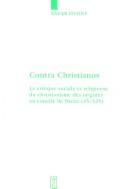| Listing 1 - 2 of 2 |
Sort by
|

ISBN: 9783110195545 3110195542 3110934892 Year: 2007 Volume: Beiheft 146. Publisher: Berlin: de Gruyter,
Abstract | Keywords | Export | Availability | Bookmark
 Loading...
Loading...Choose an application
- Reference Manager
- EndNote
- RefWorks (Direct export to RefWorks)
The persecution of the Church ordered by the Roman State, whether it was by local magistrates or on imperial command, was the most visible manifestation of the hostility directed against Christians during the first three centuries of our era. In reality however, this persecution, more virulent in some of its episodes than in others, was merely the crystallisation of the rejection of Christianity already expressed by the population at large. Christianity, spreading rapidly beyond its original Jewish context, was perceived by Graeco-Roman society through the deforming lens of ideas and values entirely foreign to it. For this reason, Christians became the victims of religious and social categorisations which forced them into the margins of society. Christianity's assimilation with superstition (Jewish origins, irrational doctrine, recruitment from the masses, doubtful practices [magic, anthropophagy, ritual murder, sexual debauchery, Christ-worship, cross-worship, sun-worship, ass-worship]) and the accusations against it of atheism (a reaction against its exclusive monotheism) and of 'hatred of mankind' (non-adherence to the common values [civil, familial or political]) reveal that public opinion played a crucial role preceding the measures taken against Christians, and that the anti-Christian hostility was a reactionary movement against a group that threatened the basic structures of the City.
Christianity and culture --- Christianity --- Church history --- Christianity and other religions --- Judaism --- Persecution --- Christianisme et civilisation --- Christianisme --- Eglise --- Judaïsme --- Persécutions --- History --- Controversial literature --- History and criticism. --- Relations --- Histoire --- Ouvrages de controverse --- Histoire et critique --- History and criticism --- 27 <37> "00/04" --- Christians --- Religious persecution --- Atrocities --- Jews --- Religions --- Semites --- Syncretism (Christianity) --- Apostolic Church --- Church, Apostolic --- Early Christianity --- Early church --- Primitive and early church --- Primitive Christianity --- Fathers of the church --- Great Apostasy (Mormon doctrine) --- Kerkgeschiedenis--Rome. Oud-Italië--?"00/04" --- Persecutions --- Religion --- Judaïsme --- Persécutions --- Christianity and culture - History - Early church, ca 30-600 --- Christianity - Controversial literature - History and criticism --- Church history - Primitive and early church, ca. 30-600 --- Christianity and other religions - Judaism - History - To 1500 --- Judaism - Relations - Christianity - History - To 1500 --- Persecution - Rome --- Paganisme et christianisme --- Juifs et chrétiens --- Early Christianity. --- New Testament. --- persecution.
Book
ISBN: 9789042935549 9042935545 Year: 2017 Volume: 33 Publisher: Leuven: Peeters,
Abstract | Keywords | Export | Availability | Bookmark
 Loading...
Loading...Choose an application
- Reference Manager
- EndNote
- RefWorks (Direct export to RefWorks)
Si le messianisme est encore aujourd'hui un objet d'étude qui passionne les historiens et les théologiens, c'est certainement parce qu'il a contribué à façonner la conception occidentale du déroulement du temps et de l'aboutissement de l'Histoire. La société moderne, pourtant sécularisée, semble plus que jamais dans l'attente du surgissement d'un monde nouveau. Cet appel sourd à un changement radical est motivé soit par le désir d'en finir avec un monde encore imprégné de valeurs jugées dépassées et inadaptées à la modernité, soit par le désir contraire de voir les valeurs traditionnelles bientôt rétablies dans leur pureté originelle. Un tel constat existe dès l'Antiquité. Certes, la croyance en Jésus devenu le Christ, c'est-à-dire le messie, façonne l'originalité chrétienne, mais elle puise dans le judaïsme ancien où fleurissent déjà les attentes messianiques. Ce livre entend restituer la pluralité des voix messianiques afin d'en saisir les spécificités dans l'histoire.
| Listing 1 - 2 of 2 |
Sort by
|

 Search
Search Feedback
Feedback About UniCat
About UniCat  Help
Help News
News